- Home
- Jude Hardin
Redline: The Reacher Experiment Book 6 (The Jack Reacher Experiment)
Redline: The Reacher Experiment Book 6 (The Jack Reacher Experiment) Read online
REDLINE
THE REACHER EXPERIMENT BOOK 6
JUDE HARDIN
About The Reacher Experiment series
Rock Wahlman: Forty-one years old, United States Navy Master at Arms, E-8, retired.
DOB 14 October 2057.
Grew up in an orphanage, recently discovered that he is the product of a human cloning experiment, an exact genetic duplicate of a former army officer named Jack Reacher.
Now someone wants all evidence of the experiment to be erased, which means that someone wants Wahlman to be erased.
He’s on the run, desperate to survive, desperate to learn the truth about why all this is happening…
Table of Contents
1
2
3
4
5
6
7
8
9
10
11
12
13
14
15
16
17
18
19
20
21
1
Way back in the middle part of the twenty-first century, around the time Rock Wahlman was born, practically every filling station in the country had been fitted with charging ports for electric vehicles. The batteries that provided the power to propel those cars and trucks from one place to another had gotten more and more sophisticated over the decades—even more so in recent years—and now, in the summer of 2098, in the United States of America and in many other nations around the world, you could drive up and plug in and be fully charged in about five minutes.
But you needed a credit card.
And Rock Wahlman didn’t have a credit card.
He paid cash for everything, and in the summer of 2098 you could still find places that would accept cash for gasoline purchases, and that was why he had traded his SUV for another vehicle with an internal combustion engine, a compact sedan this time. He couldn’t sleep in the sedan, as he had in the SUV on occasion, and he sometimes banged his right knee on the steering wheel climbing in and out, but the little car was pretty fast and it was cheap to drive and you could back it into one of the narrowest spots in a parking garage if you needed to disappear for a few days.
Those were the thoughts going through Wahlman’s mind as he cruised past the exit for Greensboro, North Carolina, at four o’clock in the afternoon on the eighth of July. Those were his thoughts, but he didn’t actually say any of those things to the man sitting in the passenger seat.
“I just like the sound of a real motor,” Wahlman said, trying to explain why he’d purchased a car that ran on gasoline, trying to keep the conversation to a minimum.
“Electric motors are real,” the man said. “And they’re better for the environment.”
The man sitting in the passenger seat seemed to know a lot about the environment. He seemed to know a lot about everything. He was getting along in years. Probably in his eighties, Wahlman guessed. The skin on his face was an odd shade of yellow, what you might come up with if you mixed some mustard into a cup of tea, and his eyes looked as though someone might have dribbled broken egg yolks into them. He had been walking backward along the edge of the highway, facing traffic, holding a cardboard sign that said MYRTLE BEACH. Wahlman wasn’t planning on going anywhere near that area, but he figured he could get the guy a hundred miles or so closer to the coast, and he figured every little bit helped.
Wahlman was on his way to visit an old friend, a fellow Master-At-Arms who’d settled down in Virginia after retiring from the Navy. The guy had been pretty good with computers, and he knew other guys who were pretty good with computers, and Wahlman was hoping that he might be able to assist him in gaining access to some classified information. Maybe the old friend could help. Maybe he couldn’t. It was worth a try.
Wahlman had stopped and picked up the hitchhiker about an hour ago. Now he was starting to wish he hadn’t. The guy talked too much, and he smelled like cigarettes and rotgut whiskey.
“I’ll be getting off the interstate and heading north in a few minutes,” Wahlman said. “Want me to drop you off at the next exit?”
“I wouldn’t mind going all the way to Norfolk with you, if that’s okay.”
“Norfolk is north of here. Since you’re trying to get to Myrtle Beach—”
“I can catch a bus for next to nothing in Norfolk,” the man said. “It’s a straight shot, right down the coast.”
“Okay,” Wahlman said.
He reached over to turn on the radio, hoping it would keep the old man from talking so much.
It didn’t.
“I’ve been sitting here beside you for over an hour, and I don’t even know your name,” the man said.
“Wendell.”
It was the name on Wahlman’s latest fake driver’s license. Wendell P. Callahan. Wahlman didn’t know what the P stood for. He figured he would just make something up if anyone ever asked.
“I’m Rusty,” the man said. “That’s what my friends always called me, anyway. Back when I had friends who were still alive. Back when I had hair that was still red.”
Rusty chuckled, his laughter quickly turning to a cough, the kind of gurgling hack that sounds like there might be something seriously wrong, the kind that you try to hold your breath for when you’re passing by the person doing the hacking in a grocery store aisle.
“You okay?” Wahlman said.
“I’m okay. You got a tissue or something?”
“Glovebox.”
Rusty opened the glove compartment, reached in and pulled out a couple of paper napkins that Wahlman had saved from couple of different fast food joints. Rusty coughed into the napkins, and then he wadded them up and tossed them on the floorboard.
“Bet you can’t guess why I’m going to Myrtle Beach,” he said.
“Why would I want to guess?” Wahlman said. “It’s none of my business.”
“Just thought you might be curious.”
Rusty coughed again. A narrow thread of bright red blood tricked down from the corner of his lips. He wiped it off with his shirt sleeve.
Wahlman had seen a lot of things as a law enforcement officer in the Navy. He had a strong stomach. There wasn’t much that bothered him. A guy sitting inches away and coughing up blood was one of the things that did. He switched off the radio. He thought about pulling over and handing Rusty a twenty and making him get out of the car right there. But he didn’t. He felt sorry for the old guy. It was obvious that he didn’t have a lot of time left.
“All right,” Wahlman said. “Tell me why you’re going to Myrtle Beach.”
“Maybe I shouldn’t tell you, come to think of it.”
“Okay.”
“It’s kind of a secret, if you want to know the truth.”
“Okay.”
“I guess I could tell you. But you have to promise not to tell anyone else. I signed some papers, and I could get into big trouble if anyone ever—”
“Tell me or don’t tell me,” Wahlman said. “It doesn’t matter to me.”
“You promise not to say anything to anyone about it?”
“I promise.”
Rusty reached into one of his pockets and pulled out a piece of peppermint candy, the kind you see in bowls on cashiers’ counters at diners sometimes. He peeled off the cellophane and slid the sugary red and white disk into his mouth. He didn’t offer Wahlman a piece. Maybe it was his last one. He contemplatively twisted the sticky little wrapper with his thumbs and forefingers for a few seconds, and th
en he flicked it on the floor next to the soggy napkins.
“Let me just start by saying that I’m a veteran,” he said. “Army. They’re the ones responsible for the shape I’m in right now, and they’re the ones who’ll be footing the bill to fix me up.”
Wahlman wondered what kind of medical procedure could possibly benefit a man of Rusty’s advanced age, a man with such glaringly obvious health issues. Doctors could do some pretty spectacular things with some pretty spectacular equipment these days, but their knowledge and skills and technological expertise could still only go so far. They still hadn’t developed a remedy for the human condition commonly known as TMB—Too Many Birthdays. They still hadn’t found a cure for that. Not that Wahlman had ever heard about.
But then maybe he hadn’t heard about everything.
He sat there with his eyes on the road and his hands on the wheel and listened while Rusty talked.
2
Rusty said that he’d recently celebrated his ninetieth birthday. Which meant that he’d been born in 2008. Which meant that he was almost fifty years older than Wahlman. He’d experienced things that Wahlman had only read about in history books. He’d seen driverless cars and thought-enhancing brain implants and flying robots that could do everything from changing a flat tire to delivering a baby. He’d seen all of that come and go. He’d seen technological advances that surely must have seemed like a good idea at the time but that had ultimately done more harm than good.
“Teleportation,” Wahlman said. “That was the last straw, right? That was when the leaders of the world got together and decided that everything needed to be dialed back a notch.”
“Ten notches was more like it,” Rusty said. “But yeah. When they figured out how to disassemble and reassemble inanimate objects at a molecular level, and when they figured out how to use specially-designed satellites and lasers to move those objects from one part of the planet to another, that was a big game changer. It revolutionized the shipping industry, for one thing. You could go online and order a couch or whatever and have it delivered to your living room in a matter of seconds.”
“Sounds great.”
“Sure. It was great. But it was all done with computers. Ninety-nine percent of it, anyway. Unemployment skyrocketed. Most of the positions that had been crucial to that particular industry were suddenly obsolete. Then other industries were affected. Just about everything you can think of. It all started toppling, like a row of dominoes. It all came too fast. The human race just wasn’t ready for it.”
“The schematics for those types of satellites and lasers are probably locked in an underground vault somewhere,” Wahlman said. “It’s only a matter of time until—”
“I don’t think so,” Rusty said. “And I’ll tell you why. If you can move a couch through space and plop it down in the middle of a living room, then you can move a bomb through space and plop it down in the middle of a city. That was where we were heading. They hadn’t figured out how to do it with nukes, but they probably would have eventually.”
“Not possible, from what I’ve read.”
“A lot of things are not possible, until suddenly they are. Anyway, the technology of the day only worked with inorganic material, so biological weapons were out, but certain enemy factions had started experimenting with a variety of chemicals. That’s why I’m coughing right now. I was exposed to KAP-Blue on the battlefield one time.”
“KAP-Blue?”
“Look it up. You’ll find it on some of the conspiracy theory sites. Nasty shit. It’ll take your ass out in a heartbeat. The Army hasn’t officially admitted that it exists, but I can tell you that it does.”
“If you were exposed to it, then how—”
“I was wearing full protective gear, but the respirators they were issuing to non-coms at the time turned out to be defective. I know for a fact that I didn’t breathe in much of that shit. If I had, I would have been dead. But I inhaled enough of it to make me sick.”
“That must have been decades ago,” Wahlman said. “How do you know that being exposed to KAP-Blue was responsible for your current condition?”
“They found traces of the compound in my liver,” Rusty said. “It was right there in black and white on the lab report. There was no way the Army could deny it. That’s why I’m on my way to Myrtle Beach right now. The Army’s performing some clinical trials down there. Experimental shit. I volunteered for it. I probably won’t live through the procedure, but maybe what they learn from me will be beneficial to some other soldiers in the future. That’s the way it works with science sometimes, right? Trial and error.”
Experimental shit. That got Wahlman’s attention. Now he was genuinely interested in what Rusty had to say.
Last year, in October, Wahlman discovered that he was an exact genetic duplicate of a former Army officer named Jack Reacher. The cells used to produce Wahlman had been taken from Reacher in 1983, over a hundred years ago. Reacher had been in Beirut, Lebanon at the time. In a hospital. Wounded. A phlebotomist had drawn some blood from him and some other officers one morning and had sent the specimens to a lab back in the States. Cells were extracted and cryogenically preserved, and then they were used for cloning experiments decades later.
Now someone was trying to hide the fact that any of that had ever taken place.
A secret experiment carried out by the Army was the reason Wahlman existed, and it was the reason that a current Army officer going by the name of Dorland was trying to make sure that he stopped existing. There had been another clone. A man named Darrell Renfro. He was dead now. Murdered. Wahlman knew that he would be next. There had been several attempts on his life already. He’d been forced to abandon his home, and his best friend had been killed, and the woman he loved had brought their relationship to a screeching halt, concerned for the welfare of her family. He needed to get to the bottom of why all this was happening, and he needed to try to put a stop to it.
“What kind of experimental shit?” he said.
“They’re going to give me a new heart, and a new liver, and a new pair of lungs.”
“What’s so unusual about that?”
“Plenty,” Rusty said.
But he refused to elaborate any further.
Because of the papers he’d signed.
“How do I know you’re not just making all this up?” Wahlman said.
“Why would I do that?” Rusty said.
“I don’t know. That’s what I’ve been trying to figure out. Maybe you think I’ll be curious enough to drive you all the way down to Myrtle Beach. Then maybe you’ll climb out of my car and have a good laugh on the way to the nearest liquor store.”
“Well?”
“Well what?”
“Are you curious enough to drive me all the way down to Myrtle Beach?”
“Maybe,” Wahlman said. “I’m still thinking about it.”
But Wahlman wasn’t really still thinking about it.
He’d made up his mind already.
He was going to Myrtle Beach.
3
Since April, when the elite military intelligence unit he was in charge of bugged out of their secret complex in the Mojave Desert and relocated to Tennessee, Colonel Dorland had been living alone in a one-room cabin on the edge of a cliff. He liked it up there, for the most part. It was extremely private, and on a clear day you could walk out onto the deck and see for miles.
July 8 was a clear day.
But Colonel Dorland wasn’t seeing what he wanted to see.
“Too much foliage this time of year,” Lieutenant Talfin said, stepping up to the railing and gesturing out toward the landscape. “But I can assure you that it’s down there. You can probably see the roof, right here from your deck, in the late fall and winter, after the trees lose their leaves. No telling what you might be able to see with a telescope that time of year, or even a good pair of binoculars.”
Talfin had broken the news to Colonel Dorland over the phone a couple of hours ago. There was
a fairly large lake at the bottom of the mountain, down in the valley, and according to Talfin, a very nice house had been built on a thirty-acre parcel of land that skirted the shore. Kasey Stielson’s parents owned the property, and Kasey and her daughter had been staying there with them until recently. Apparently Rock Wahlman had been staying there too, at least for a while. His fingerprints were all over the place.
Colonel Dorland could see part of the lake from his deck, but he couldn’t see the house.
“Why are we just now finding out about this?” he said.
“The deed was registered under a corporate name. Kasey’s father owns several—”
“Where’s Kasey’s father now?”
“We don’t know, sir. The whole family’s gone. They must have found another—”
“We’re supposed to be an intelligence unit,” Colonel Dorland said. “We’re supposed to be the best in the world at this kind of shit. You’re telling me that Wahlman was right under my nose. He was right down there in that valley, less than five miles away, and I didn’t even know it. This phase of our operation could have been completed months ago. Yet here we stand with our clueless collective thumbs up our clueless collective asses. Do you know what kind of shit storm I’m likely to be facing because of this, Lieutenant Talfin? Do you have any idea?”
“We’ll find them, sir. It’s just going to take a little more time.”
This wasn’t the first time that Talfin had dropped the ball, or even the second time. He was the kind of officer who was really smart when it came to books. Second in his class at WestPoint, first in his class at MCO—the Army’s two-year program for newly-commissioned officers interested in careers that involved covert operations. He was extremely knowledgeable, but he didn’t seem to be able to put much of that knowledge to use when it came to practical applications. He’d been in charge of cyber security at the facility in California. After the breach that prompted the Code Charlie Foxtrot and the subsequent emergency location change, Dorland had allowed him to continue working with the unit as Second Research Officer. So far, he’d managed to maintain the rank of lieutenant, but he’d been skating on thin ice for quite some time now.

 Ricochet: The Jack Reacher Experiment Book 8
Ricochet: The Jack Reacher Experiment Book 8 Blood Tattoo (A Nicholas Colt Thriller Book 5)
Blood Tattoo (A Nicholas Colt Thriller Book 5) Racked (A Lt. Jack Daniels / Nicholas Colt mystery)
Racked (A Lt. Jack Daniels / Nicholas Colt mystery)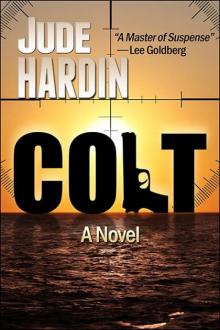 COLT (A Nicholas Colt Thriller)
COLT (A Nicholas Colt Thriller)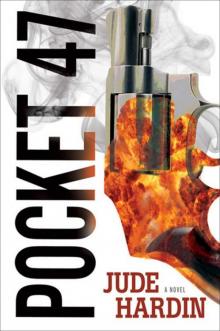 Pocket-47 (A Nicholas Colt Thriller)
Pocket-47 (A Nicholas Colt Thriller)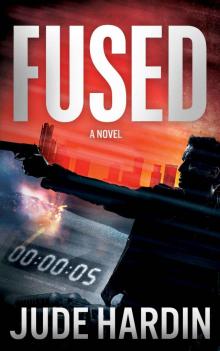 FUSED: iSEAL OMNIBUS EDITION (A Military Technothriller)
FUSED: iSEAL OMNIBUS EDITION (A Military Technothriller) THE JACK REACHER FILES: CHOKE 2 (Episode 2 in the CHOKE Series)
THE JACK REACHER FILES: CHOKE 2 (Episode 2 in the CHOKE Series) Snuff Tag 9 (A Nicholas Colt Thriller Book 3)
Snuff Tag 9 (A Nicholas Colt Thriller Book 3) THE JACK REACHER FILES: HOSTAGE
THE JACK REACHER FILES: HOSTAGE THE JACK REACHER FILES: THE GIRL FROM THE WRONG SIDE OF CORDIAL (with Bonus Thriller THE BLOOD NOTEBOOKS)
THE JACK REACHER FILES: THE GIRL FROM THE WRONG SIDE OF CORDIAL (with Bonus Thriller THE BLOOD NOTEBOOKS) 3 TERRIFYING THRILLERS
3 TERRIFYING THRILLERS The Jack Reacher Files: Fugitive
The Jack Reacher Files: Fugitive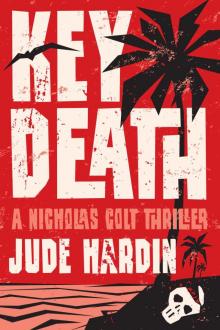 Key Death (A Nicholas Colt Thriller Book 4)
Key Death (A Nicholas Colt Thriller Book 4) SYCAMORE BLUFF (Prequel to THE JACK REACHER FILES: ANNEX 1) (A Nicholas Colt Thriller Book 8)
SYCAMORE BLUFF (Prequel to THE JACK REACHER FILES: ANNEX 1) (A Nicholas Colt Thriller Book 8) VELOCITY
VELOCITY Fire and Ice
Fire and Ice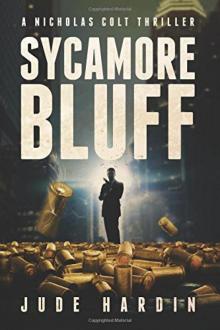 Sycamore Bluff
Sycamore Bluff Jack Reacher Files_Velocity
Jack Reacher Files_Velocity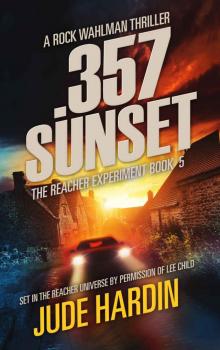 357 Sunset
357 Sunset THE JACK REACHER FILES: CHOKE (Episode 1 in the CHOKE Series)
THE JACK REACHER FILES: CHOKE (Episode 1 in the CHOKE Series)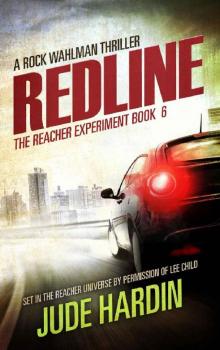 Redline: The Reacher Experiment Book 6 (The Jack Reacher Experiment)
Redline: The Reacher Experiment Book 6 (The Jack Reacher Experiment) Fugitive
Fugitive Fire and ice dm-8
Fire and ice dm-8 American PI
American PI THE JACK REACHER FILES: ANNEX 1 (A Novel of Suspense)
THE JACK REACHER FILES: ANNEX 1 (A Novel of Suspense) THE JACK REACHER FILES: VELOCITY (with bonus thriller CROSSCUT)
THE JACK REACHER FILES: VELOCITY (with bonus thriller CROSSCUT)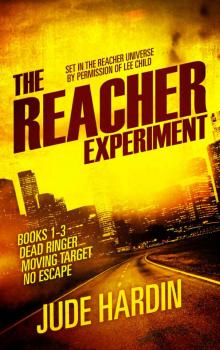 The Reacher Experiment
The Reacher Experiment Hostage
Hostage Crosscut (A Nicholas Colt Thriller Book 2)
Crosscut (A Nicholas Colt Thriller Book 2) Lady 52: A Jack Daniels/Nicholas Colt Novel
Lady 52: A Jack Daniels/Nicholas Colt Novel